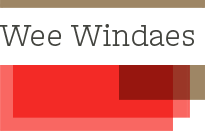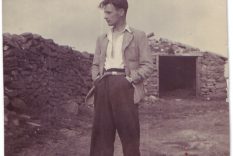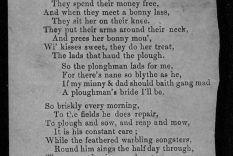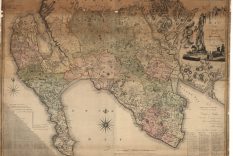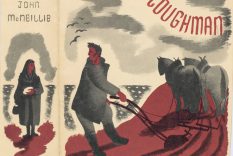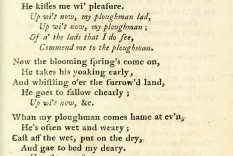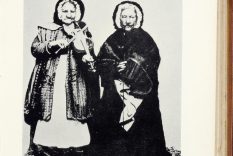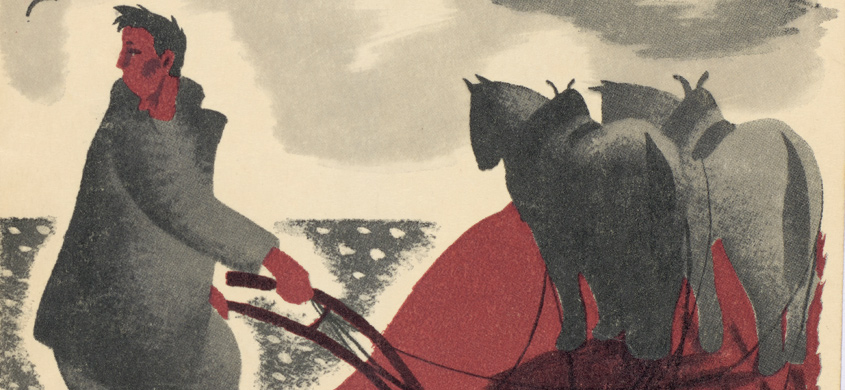
‘Wigtown Ploughman Part of His Life’ wis the 1939 debut novel bi John McNeillie, imprentit forehaund ilka week in the Sunday Mail. A tale o skaith, druckenness an lowse morals that bade in the landwart o soothwest Scotland, Wigtown Ploughman maks fir a camsteirie antidote tae the richtous warld o Burns’ ‘The ‘Cotter’s Saturday Night’ and wid gan on tae mak a muckle stoushie on its imprent.
While the ongauns are scrievit in English, the wirthies wi’in the pages o Wigtown Ploughman are gien in braid Gallowa Scots. McNeillie, wha alsae scrievit unner Ian Niall, staunds in a lang line o scrievers aby an praisent wha hae scrievit in the rowthie Gallowa tung or hae been muived bi the brawness, pouer an busteous history o the Gallowa kintra. Amang thaim are William Nicholson (1782-1849), SR Crocket (1859-1914), William Neill (1922-2010), an praisent-day scrievers Liz Niven, Rab Wilson, Stuart A Paterson an James Andrew Begg.
Gallowa Scots haes a wheen wirds an pronunciations lanerly tae the soothwest, tho these can chynge whan traivelin atween districks. In the mair westren pairt cried the Rhins the Irish influence is mair tae the fore an is whiles kent as ‘Galloway Irish’. Stranraer haes a puckle o braw wirds still in common yaise sic as ‘stenter’ for claes-pole an ‘fecket’ fir jaiket.
Lear mair aboot Wigtown Ploughman an Gallowa Scots
‘Wigtown Ploughman Part of His Life’ merks the cammin o age o heidmaist chairacter Andy Walker, wha ettles throu the cottar system in Gallowa tae heize himsel up frae laichmaist joab as ‘boy’ or lawly fairm darger tae the covetit staundin o plooman. Andy’s upbring is afflictit bi the ill-daeins o his faither an the puirtith imponed oan the tenant fairms o soothwest Scotland an is whiles lichtened bi his passions fir heidin oot in the howe o nicht tae gan tae the poachin. Whan Andy’s schuilin is ower, he taks the gait tae fin wark oan the fairms. Oan these carrants he meets wi a wheen o wirthies, fechts an sexual encoonters alang the wey. Alike tae McNeillie’s saicent novel, ‘Glasgow Keelie’, which bides in the Glesga slums, (see Martha Spreull an Glesga Scots) baith these brutal warlds are tuim o the slichtest conceits tae sentiment or romance, wi ther chairacters likewse tuim tae the smawest pangs o conscience or remorse. It is nae wunner then that McNeillie’s fiction, an maist merkitly Wigtown Ploughman, wid lead tae its dingin-doon frae baith pulpit an pen. The tirrievee anent the social evils exposed in McNeillie’s novel, houanivir, wid mak it kent as a social commentary oan the leevin conditions an puirith o the Gallowa cottars in 1930s Scotland, an wid in fack hae muckle inpit taewards this verra issue bein heizit in the communins o the Westminster Pairliament. Pairt o the impack o the novel wis the reddin up o a committee tae speir intae the conditions tholed bi cottars, an wid lead tae the eventual implementation o the Rural Workers Housing Act of 1926 (amended in 1938).
McNeillie wid cam tae ken Gallowa fairm life whan, afore he wis twa year auld, due tae illness amang his faimily he wis sent frae his parental hame in Auld Kilpatrick, Dumbartonshire tae bide wi grandfaither an grandmither John an Elizabeth McNeillie at North Clutag Fairm in Wigtoonshire. Auld John haed a rowth o stories an the young loon wis fair taen wi baith him an wi Gallawa life, the ootcome o whit wid impack oan a lifetime’s scrievin, forehaund as John McNeillie an hinmaist as Ian Niall. ‘Wigtown Ploughman’ wis descrievit as ‘a novel of no little distinction and power’ (Sunday Times). Tae ane ither critic, tho sair trauchelt wi its veeolence, ‘Wigtown Ploughman’ wis descrievit as ‘shot through with beauty’, wi the same critic heizin it as a wark o authenticity.
Ther’s a gey wheen o pithy passages in ‘Wigtown Ploughman’, nae least whan Andy sets tae wark wi the ‘oul man’ at Drumlin Fairm, an the sair fecht they meet wi in the unendin strauchle wi wund, wither an syle. Andy wins in his ettle tae become plooman, brutalised an compromised in turn, gannin frae fairm tae fairm an meetin wi a thrang o ill-daein an randie wirthies alang the wey. Scrievin as Ian Niall, MacNeillie wid gan oan tae scrieve ower forty bukes. Amang his best kent are ‘The Poacher’s Handbook’ an his memoir ‘A Galloway Childhood’. He scrievit a saicent novel anent Gallowa kintra life, ‘Morryharn Farm’. His first novel as Ian Niall, ‘No Resting Place’, is set amang the traiveller ‘tinker’ clans o soothwest Scotland an wis makkit intae a film, tho the story wis relocatit tae Coonty Wicklow in Ireland. Released in 1952 it wint oan tae win gey guid acclaim at the Venice Film Festival. John McNeillie is keppit mynd o in a leebrar tae his name in Wigtoon. In 1998 he wis made a Doctor of Letters bi the University o Glesga fir his inpit tae Scottish literatur.
The Naitional Leebrar hauds a rowth o materials frae the pen o John McNeillie / Ian Niall an its manuscripts department hauds a hairstin o papers belangit tae the late John McNeillie, wi letters, reviews an original manuscripts amang thaim. In 2012, Birlinn imprentit a new edition o Wigtown Ploughman wi an introduction by the scriever’s son, Andrew McNeillie.
Ther is alsae a rowth o warks bi ither Gallovidian scrievers haudit in the Naitional Leebrar. William Nicholson (1782-1849) as weel as bein a Scots poet had the makkins o a byordnar chairacter. Nicholson hailed frae the parish o Borgue in Gallowa. As a bairn he wis kenspeckle wi Ramsay’s ‘Gentle Shepherd’ an wi Burns, whase warks at thon time wir beginnin tae be kent near an faur. While at schuil ‘Wull’ wis said tae be an upsitten scholart wha wid raither stravaig alang the banks o Tarff than bide in the clessroom. Accoonts o Nicholson’s life kythe him tae be wanchancy in his chosen profession o chapman, an tell that he wis gien tae ower much distraction tae win muckle siller in the packman’s tred. It wis durin these carrants houanivir that Nicholson wid gie vyce tae his poems an sangs, an whaur his reputation as bard wid growe. He won 1,500 subscribers fir his first collection o poems, gannin tae Edinbrugh whaur he met wi James Hogg wha ettled tae gie a haund in the imprentin o Nicholson’s warks. Hogg’s inpit is is takken tent o in Nicholson’s introduction tae his 1814 ‘Tales in Verse’.
Nicholson tholed the chapman tred fir 25 years. He became weel-kent as sangwriter, scrievin ‘The Braes of Galloway’ an ‘The Banks of Tarff’. He alsae gart repute as a braw piper. Nicholson’s best kent wark is ‘The Brownie of Blednoch’ a poem anent an elritch craitur wha haunts that particular districk o Gallowa.
‘For a foul and a stalwart ghaist is he,
Despair sits brooding aboon his e’e bree,
And unchancie to light o’ a maiden’s e’e,
Is the grim glower o’ Aiken-drum.’
Wi an ower-fondness fir the bevie, Nicholson wis said tae be gien tae spells o orra behaviour, scrievin a tract oan Universal Redemption which he then cairrit oan fit tae Lunnon in an attempt tae praisent it afore the King. He won siller fir a time as drover an it wis oan these carrants, in the Lancashire toon o Warrington, Nicholson wis herrit bi reivers an bung intae a canal, awmaist droonin.
Like Burns, Nicholson’s poems are a mixter-maxter o Scots an English or are gied as either Scots or English poems or sangs. His maist feckfu warks are in his mither tung, in poems sic as ‘The Country Lass’, ‘On Tobacco’ or ‘The Brownie of Blednoch’, which is thocht tae be the ruits o popular bairns’ sang ‘Aiken Drum’. (See ‘Popular Rhymes of Scotland’). Nicholson’s ‘The Braes of Galloway’ became kent in the Scottish sang tradition as ‘The Galloway Hills’ tho the wirds hae chynged ower generations. This sang has been covert bi mony singers ower the years frae legendary folk singer Jeannie Robertson tae Scotland’s best-kent rock combo, The Sensational Alex Harvey Band. Frae Nicholson’s blate comments in his introduction tae ‘Tales in Verse’, little cuid he hae kent that his poems an sangs wid still impack oan traditional an popular culture the day. Gallowa scriever John Hudson has ettled in recent times tae gie tent tae Nicholson throu his 1999 imprent ‘The Collected Poems of William Nicholson ‘The Bard of Galloway”. Fir mair insicht intae Nicholson’s life an warks, see the article scrievit bi John Hudson.
It is the novelist SR Crockett wha gies his name in the Introduction tae the 1901 imprent o ‘Galloway Gossip’, (or ‘Gallawa Gossip as it is kent wi’in its pages). Allegedly the wark o ane Dr De Bruce Trotter it wis first imprentit in 1877. A hairstin o anecdotes an ferlies frae the Stewartry districk o Gallowa – ‘which lies between the Merrick and the water of Ken’ – the Preface gies a halesome defence fir Gallawa Gossip bein gien hale-an-hauden in Scots, as weel as an ower-view oan the Scots tung itsel. ‘Gallawa Gossip’ haes a fouth o joco tales, houanivir it is blichtit bi gien a kythin tae a wheen o nairae-nebbit views. These micht be aboot ‘Incomers’ frae Ayrshire, or anent the ‘Glesca-Eerish’ or ‘Dundee-Eerish’. Whitever the case, ‘Gallawa Gossip’ whiles gies rein tae some bigoted views that wid scarce be tholed in the praisent-day.
A nummer o novels bi SR Crockett (1859-1914), are scrievit intae the verra Gallowa landscape. Amang thaim are ‘The Raiders’, ‘Dark o the Moon’ an ‘Men of the Moss Hags’. Crockett’s stories met wi muckle popularity an he wis a bestseller o his day, scrievin fast-muivin historical fiction set amang covenantin an smugglin intrigues o southwest Scotland. Chairacter vyces are aften gied in fouthy Gallowa Scots. Crockett came tae the fore eftir the imprentin o his story collection ‘The Stickit Minister’. Crockett himsel wid become a Free Kirk meenister, a cawin he lowsed frae tae wark oan his scrievin. Wi the advent o the late modernity period Crockett’s fiction wid faw oot o fashion, houanivir it has been gied mair recent tent throu the imprentin o a nummer o warks editit bi Cally Phillips, hairstit thegither as ‘The Galloway Collection’ wi a total o 32 titles in aw. The Naitional Leebrar hauds a nummer o original copies o Crockett’s novels as weel as some o the 2014 Phillips’ editit imprents.
The poet William Neill (1922-2010) wis born in Ayrshire an wid sattle as dominie o English in Castle Douglas in Gallowa. Neill scrievit in Scots, Gaelic an English. This is shawn in his ‘Wild Places: Poems in Three Leids’. He alsae owerset a nummer o European poems intae Scots, amang them his owersettin o Homer. Neill focht strangly fir minority leids an descrievit his wark as ‘a standing up for the small tongues against the big mouths’. Neill’s poems – whither in English or Scots – hae aften been inspired bi the Gallowa landscape, as kythed in poems sic as ‘Seasons’. Amang his warks at the Naitional Leebrar are ‘Wild Places poems in three leids (1985) an ‘Tales Frae the Odyssey o Homer owerset intil Scots’ (1992). Ther are alsae soond recordins o baith forenemmit twa works.
Gallowa past an praisent, an soothwest Scotland as a hale, continues tae gie inspiration tae literatur in Scots. James Andrew Begg’s novel in Scots ‘The Man’s the Gowd for a that’, imprentit in 2013, muives frae praisent-day Ayrshire back tae the ‘Killing Times’ o the late 17th century whaur it then biggs intae a generational tale tellt ower three centuries. James Andrew Begg has been scrievin in Scots ower the years an amang his warks in Scots at the Naitional Leebrar are ‘Alison’s Jants in Ferlieland by Lewis Carol owerset intae West Central Scots’ (2014) an ‘Dipper an the three wee deils’ bi J A Begg an J Reid (1990).
Liz Niven is a poet in Scots an English whase wark aften gies vyce tae Gallowa landscape an history. She haes been involved in Scots learin an resources ower a nummer o years. Amang her warks haudit in the Naitional Leebrar are:
- ‘Cree Lines’ (2000)
- ‘Haud Yer Tongue. Teachers Guide’ (1997)
- ‘Extracted fae a drunk wumman sittin oan a thistle’ (2000).
The Dark Sky Observatory at Loch Doon, a loch that raxes frae Sooth Ayrshire doon intae the Gallowa Forest Park, wis the settin fir Rab Wilson’s jynt 2016 McCash Prize-winnin poem ‘Ayont the Sun’. A former coal-miner an psychiatric nurse, Rab Wilson haes been active in Scots scrievin ower the years. Amang his warks haudit at the Naitional Leebrar are:
- ‘Accent o the mind: poems, chiefly in the Scots language’ (2006)
- ‘Map for the Blind: poems, chiefly in the Scots language’ (2011)
- ‘Ruba’iyat of Omar Khaymm in Scots’ (2004).
The muckle subscribed James McCash Scots Poetry Competition is run jyntly bi The Herald newspaper an the University o Glesga an wis set up tae celebrate an tae promuive the scrievin o poetry in Scots.
Anither poet wha taks muckle influence frae Gallowa landscape an life is Stuart A Paterson, the Scots Language Centre’s virtual Poet in Residence in 2015 an poet in residence fir BBC Radio Scotland in 2017-18. As ane reviewer notes, Paterson’s poetry maks weel in ‘making the topography of Galloway and Solway the site of varied poetic weather’. The same reviewer taks tent o his ‘seamless’ yaise o Scots whaur ‘clouds are ‘shilpit’, crows are ‘droukit’, children are described as ‘troupes of weans’ and local characters come a cropper ‘stealing a wheen of neeps'(sabotagereviews August 2016). Titles bi Stuart A paterson haudit at the Naitional Leebrar include:
- ‘Aye’ (2016)
- ‘Border Lines’ (2015)
- ‘Saving Graces’ (1997)
‘Wigtown Ploughman Part of His Life’ was the 1939 debut novel by John McNeillie, originally published in weekly serials in the Sunday Mail. A tale of violence, drunkenness and immorality that dwelt in the rural parts of southwest Scotland, Wigtown Ploughman provides a riotous antidote to the righteous world of Burns’ ‘The ‘Cotter’s Saturday Night’ and would go on to cause a considerable furore on its publication.
While the narrative is written in English, the characters within the pages of Wigtown Ploughman are given in broad Galloway Scots. McNeillie, who also wrote under Ian Niall, stands in a long line authors past and present who have written in the rich Galloway tongue or have been inspired by the beauty, power and turbulent history of the Galloway countryside. Among these are William Nicholson (1782-1849), SR Crocket (1859-1914), William Neill (1922-2010), and present-day writers Liz Niven, Rab Wilson, Stuart A Paterson and James Andrew Begg.
Galloway Scots has a number of words and pronunciations unique to the southwest, though these can differ when travelling between districts. In the more westerly part called the Rhins the Irish influence is more prominent and is sometimes known as ‘Galloway Irish’. Stranraer has a number of interesting words still in common use such as ‘stenter’ for clothes-pole and ‘fecket’ for jacket.
Learn more about Wigtown Ploughman an Gallowa Scots
‘Wigtown Ploughman Part of His Life’ marks the coming of age of principal character Andy Walker, who resolves through the tenant-farm system in Galloway to raise himself up from the lowest employment as ‘boy’ or lowly farm worker to the coveted position of ploughman. Andy’s upbringing is afflicted by the dissolute behaviour of his father and the poverty imposed on the tenant farms of southwest Scotland and is occasionally lightened by his passion for going out in the dead of night to poach. When Andy’s schooling is over he takes to the road to find work on the farms. On these adventures he meets with a number of characters, fights and sexual encounters along the way. Similarly to McNeillie’s second novel, ‘Glasgow Keelie’, which dwells in the Glasgow slums, both of these brutal worlds are void of the slightest conceit to sentiment or romance, with their characters being likewise oblivious to the slightest pangs of conscience or remorse. It is no wonder then that McNeillie’s fiction, and most notably Wigtown Ploughman, would lead to its condemnation from both pulpit an pen. The furore over the social evils exposed in McNeillie’s novel, however, would make the book known as a social commentary on the living conditions and poverty of the Galloway tenant farmers in 1930s Scotland, and would in fact have considerable influence towards this issue being raised in the debates of the Westminster Parliament. Part of the impact of the novel was the setting up of a committee to enquire into the conditions suffered by tenant farmers, and this would lead to eventual implementation of the Rural Workers Housing Act of 1926 (amended in 1938).
McNeillie would come to know Galloway farm life when, due to illness in his family before he was two years old, he was sent from his parental home in Old Kilpatrick, Dunbartonshire to live with his grandfather and grandmother John and Elizabeth McNeillie at North Clutag Farm in Wigtownshire. Old John had a wealth of stories and the young boy was fair taken with both him and Galloway life, the outcome of which would impact on a lifetime’s writing, firstly as John McNeillie and latterly as Ian Niall. Wigtown Ploughman was described as ‘a novel of no little distinction and power’ (Sunday Times). To another critic, though disturbed by its violence, Wigtown Ploughman was described as ‘shot through with beauty’, with the same critic praising it as a work of authenticity.
There are a considerable number of powerful passages within Wigtown Ploughman, not least when Andy sets to work with the ‘oul man’ at Drumlin Farm, and the privations they come up against in the perennial struggle with wind, weather and soil. Andy realises his ambition to become a ploughman, brutalised an compromised in turn, going from farm to farm and meeting with a host of dissolute and boisterous characters along the way. Writing as Ian Niall, MacNeillie would go on to write over forty books, among his best known are ‘The Poacher’s Handbook’ and his memoir ‘A Galloway Childhood’. He wrote a second novel about Galloway country life, ‘Morryharn Farm’. His first novel as Ian Niall, ‘No Resting Place’, is set among the travelling ‘tinker’ clans of southwest Scotland and was made into a film, though the story was relocated to County Wicklow in Ireland. Released in 1952 it went on to receive considerable acclaim at the Venice Film Festival. John McNeillie is commemorated in a library to his name in Wigtown. In 1998 he was made a Doctor of Letters by the University of Glasgow for his contribution to Scottish literature.
The National Library holds a wealth of materials from the pen of John McNeillie/Ian Niall and its manuscripts department holds a collection of papers belonging to the late John McNeillie, with letters, reviews and original manuscripts among them. In 2012 Birlinn published a new edition of Wigtown Ploughman with an introduction by the author’s son, Andrew McNeillie.
There are also a number of works by other Gallovidian writers held in the National Library. William Nicholson (1782-1849) as well as being a Scots poet had the makings of an extraordinary character. Nicholson came from the parish of Borgue in Galloway. As a child he became familiar with Ramsay’s ‘Gentle Shepherd’ and with Burns, whose fame at that time was beginning to spread. While at school ‘Wull’ was said to be an indifferent pupil who would rather wander along the banks of the River Tarff than stay in the classroom. Accounts of Nicholson’s life show him to be ill-fated in his chosen occupation of packman, and tell that he was given to too much distraction to make a decent living in the pedlar’s trade. It was during these ventures however that Nicholson would give voice to his poems and songs and where his reputation as a poet would flourish. He attracted fifteen hundred subscribers for his first collection of poems, travelling to Edinburgh where he met with James Hogg who assisted in the publication of Nicholson’s works. Hogg’s assistance is acknowledged in Nicholson’s introduction to his 1814 ‘Tales in Verse’.
Nicholson endured as a pedlar for twenty five years. He became well known as a songwriter, writing ‘The Braes of Galloway’ and ‘The Banks of Tarff’. He also earned a reputation as a fine piper. Nicholson’s best known work is ‘The Brownie of Blednoch’ a poem about a weird creature who haunts the Bladnoch area of Galloway.
‘For a foul and a stalwart ghaist is he,
Despair sits brooding aboon his e’e bree,
And unchancie to light o’ a maiden’s e’e,
Is the grim glower o’ Aiken-drum.’
With a proclivity for strong alcohol, Nicholson was said to have indulged in episodes of eccentric behaviour, writing a tract on Universal Redemption which he then took on foot to London in an attempt to present it before the King. He earned a living for a time as a drover and it was while on these travels in the Lancashire town of Warrington that he was plundered by robbers and thrown into a canal, almost drowning.
As with Burns, Nicholson’s poems are a blend of Scots and English or stand alone as either Scots or English poems or songs. His most potent works are in his mother tongue, in poems such as ‘Country Lass’, ‘On Tobacco’ or ‘The Brownie of Blednoch’, which is thought to be the original version of the popular children’s song ‘Aiken Drum’. (See ‘Popular Rhymes of Scotland’). Nicholson’s ‘The Braes of Galloway’ became known in the Scottish song tradition as ‘The Galloway Hills’ though the words have changed over generations. This song has been covered by many singers over the years from legendary ballad singer Jeannie Robertson to Scotland’s most famous rock band, The Sensational Alex Harvey Band. From Nicholson’s modest comments in his introduction to ‘Tales in Verse’, little could he have known that his poems and songs would still impact on traditional and popular culture today. Galloway writer John Hudson has made steps in recent times to give recognition to Nicholson through his 1999 publication ‘The Collected Poems of William Nicholson “The Bard of Galloway”‘. For deeper insight into Nicholson’s life and works, see the article written by John Hudson.
It is the novelist SR Crockett who gives his name in the Introduction to the 1901 publication of ‘Galloway Gossip’, (or ‘Gallawa Gossip’ as it is called within its pages). Allegedly the work of one Dr De Bruce Trotter it was first published in 1877. A collection of anecdotes and literary curiosities from the Stewartry area of Galloway – ‘which lies between the Merrick and the water of Ken’ – the Preface gives a wholesome defence for Galloway Gossip being written entirely in Scots, as well as an overview on the Scots tongue itself. ‘Galloway Gossip’ has a number of comic tales, it is however blighted by giving air to a number of narrow prejudices. These might be about ‘Incomers’ from Ayrshire, or about the ‘Glesca-Eerish’ or ‘Dundee-Eerish’. Whatever the case, ‘Galloway Gossip’ occasionally gives rein to some bigoted views that would scarcely be tolerated in the present-day.
A number of novels by SR Crockett (1859-1914), are written into the very Galloway landscape. Among them are ‘The Raiders’, ‘Dark o the Moon’ and ‘Men of the Moss Hags’. Crockett’s stories met with huge popularity and he was a bestseller of his day, writing fast-moving historical fiction set among the covenanting and smuggling intrigues of southwest Scotland. Character voices are often given in rich Galloway Scots. Crockett came to the fore following the publication of his story collection ‘The Stickit Minister’. Crockett himself would become a Free Church minister, a calling he left to work on his writing. With the advent of the late modernity period Crockett’s fiction would fall out of fashion, however it has been given more recent recognition through publication of a number of works edited by Cally Phillips, collected together as ‘The Galloway Collection’ with a total of 32 titles in all. The National Library holds a number of original copies of Crockett’s novels as well as some of the 2014 editions as edited by Cally Phillips.
The poet William Neill (1922-2010) was born in Ayrshire and would settle as an English teacher in Castle Douglas in Galloway. Neill wrote in Scots, Gaelic and English. This is evident in his ‘Wild Places: Poems in Three Leids’. He also translated a number of European poems into Scots, among them his translation of Homer. Neill championed minority languages and described his work as ‘a standing up for the small tongues against the big mouths’. Neill’s poems – whether in English or Scots – have often been inspired by the Galloway landscape, as shown in poems such as ‘Seasons’ (see link below). Among his works at the National Library are ‘Wild Places poems in three leids (1985)’ and ‘Tales Frae the Odyssey o Homer owerset intil Scots’ (1992). There are also sound recordings of both of these latter two works.
Galloway past and present, and southwest Scotland as a whole, continues to give inspiration to literature in Scots. James Andrew Begg’s novel in Scots ‘The Man’s the Gowd for a that’, published in 2013, moves from present-day Ayrshire back to the ‘Killing Times’ of the late seventeenth century where it then builds into a generational tale told over three centuries. James Andrew Begg has been writing in Scots over the years and among his works in Scots at the National Library are ‘Alison’s Jants in Ferlieland by Lewis Carol owerset intae West Central Scots (2014) and ‘Dipper an the three wee deils’ bi J A Begg an J Reid (1990).
Liz Niven is a poet in Scots and English whose work often gives voice to Galloway’s landscape and history. She has been involved in Scots learning and resources over a number of years. Among her works held in the National Library are:
- ‘Cree Lines’ (2000)
- ‘Haud Yer Tongue. Teachers Guide’ (1997)
- ‘Extracted fae a drunk wumman sittin oan a thistle’ (2000).
The Dark Sky Observatory at Loch Doon, a loch which stretches from South Ayrshire and down into the Galloway Forest Park, was the setting for Rab Wilson’s joint 2016 McCash Prize-winning poem ‘Ayont the Sun’. A former coal-miner and psychiatric nurse, Rab Wilson has been active in Scots writing over the years. Among his works held at the National Library are:
- ‘Accent o the mind: poems, chiefly in the Scots language’ (2006)
- ‘Map for the Blind: poems, chiefly in the Scots language’ (2011)
- ‘Ruba’iyat of Omar Khaymm in Scots’ (2004)
The popularly subscribed James McCash Scots Poetry Competition is run jointly by The Herald newspaper and Glasgow University and was set up to celebrate and to promote the writing of poetry in Scots.
Another poet who takes considerable influence from Galloway landscape and life is Stuart A Paterson, the Scots Language Centre’s virtual Poet in Residence in 2015 and poet in residence for BBC Radio Scotland in 2017-18. As one reviewer notes, Paterson’s poetry excels in ‘making the topography of Galloway and Solway the site of varied poetic weather’. The same reviewer notes his ‘seamless’ use of Scots where ‘clouds are ‘shilpit’, crows are ‘droukit’, children are described as ‘troupes of weans’ and local characters come a cropper ‘stealing a wheen of neeps’.’ (sabotagereviews August 2016). Titles by Stuart A Paterson held at the National Library include:
- ‘Aye’ (2016)
- ‘Border Lines’ (2015)
- ‘Saving Graces’ (1997)
- Author:
- John McNeillie
- Publication Date:
- 1939
- Imprentit:
Wigtown Ploughman
‘For a foul and a stalwart ghaist is he,
Despair sits brooding aboon his e’e bree,
And unchancie to light o’ a maiden’s e’e,
Is the grim glower o’ Aiken-drum.’
Frae ‘The Brownie of Blednoch’ by William Nicholson
